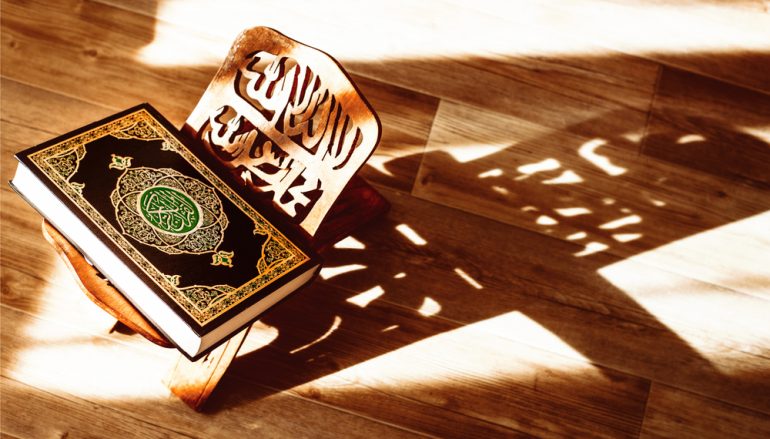The Islamic Shariah fully covers a Muslim’s life from birth to death reminding him at every step that he is a bondsman of Allah, a member of the Ummah (community) of the Prophet of Islam, and a follower of a specific way of life. He thus remembers that he should take the religious code of Islam as his guide and try to live by sincerely adhering to it until his last moment in this world.
Birth of a Child and Calling Adhan and Iqamah in His Ears
When a baby is born in a Muslim family, a pious person from the family or neighbourhood first calls Adhan (prayer call) in his right ear and Iqamah (call marking the beginning of the prayer) in his left. The Adhan and the Iqamah are specifically related to Salah (prayer).
The baby quite obviously does not understand the meaning and implication of such calls. The aim behind this practice however is that the baby should first of all hear the name of Allah and call for His worship in this world.
It is also a practice to put a very small piece of a date chewed by a pious person for this purpose in the mouth of the baby as a mark of blessing. This practice is authenticated by a tradition of the Prophet of Allah.
Shaving the Head of the Child and Aqeeqah
It is Mustahab (An act which fetches rewards if done, but if missed, is not punishable.) to shave the head of the child (called Aqeeqah) on the seventh day of his birth. If it is not done then it could be done on the fourteenth or even later.
Two goats are sacrificed at the birth of a male child and one at that of a female one. The meat of the sacrificed animal is distributed among the poor and relatives. It is cooked in the family and is eaten and fed to others. Aqeeqah however is not obligatory on Muslims nor is sacrificing of animals. If one is not financially well off to bear the expenses of sacrificing an animal, he does not have to do it.
Giving a Name to the Child
Usually on the occasion of Aqeeqah the child is given a name. A pious person from the family or neighbourhood suggests the name or the parents themselves select a name of their choice.
Arabic names belonging to Islamic traditions are preferred so that the religious affiliation of the child may be reflected from his name. Muslim thinkers believe that there are definite psychological benefits of this practice.
Good Names for a Muslim Child
The Islamic Shariah has not made Muslims responsible for any specific names. However it has provided guidance that the best names for Muslims are those which reflect man’s bondsmanship to Allah alone (which is the essence of Tawheed, belief in the Oneness of God). This is the reason why most Muslim names begin with the word “Abd” (slave), such as Abdullah, Abdur Rahman, Abdul Wahid, Abdul Ahad, Abdus Samad, Abdul Azeez, Abdul Majeed etc and the second part in these names are names of Allah signifying His attributes.
Bad Names for a Muslim Child
It has also been emphasized that a Muslim name should not contain any word suggesting arrogance and disobedience. Accordingly, names such as Malikul Mulk (ruler of the universe) and Shahanshah (King of Kings) are disapproved.
Adopting Names of Prophets and Sahabah
In selecting a name for a child a Muslim’s mind is first directed toward the name of the Prophets of Allah and those of Companions of Prophet Muhammad. A Muslim gives one of these names to his child as a mark of good wishes hoping that it would attract Allah’s mercy.
It is interesting to note that although Prophet Muhammad is a descendant of Prophet Ismail and that the Jews are descendents of Prophet Ishaque, Muslims frequently take names of the Prophets from the descendents of Prophet Ishaque (known as Bani Israil) in spite of long-standing differences between the Muslims and the Jews.
This is so because according to the teachings of Islam all Prophets are to be respected and believed in, whether they are from Bani Israel (Children of Israil) or Bani Ismail (Children of Ismail). Muslims do not have any prejudice in choosing names for themselves. That is why in India alone, for example, millions of Muslims are named after Prophet Ishaque and his children. They are thus called Ishaque, Yaqoob, Yusuf, Dawood, Sulaiman, Musa, Haroon, Isa, Imran, Zakariya and Yahiya– all of whom are from the Bani lsrail tribe.
Similarly in Muslim women Maryam, Safwa, and Asiya are common names, which are the names of pious women form the Bani lsrail clan.
Teaching the Child Etiquette of Purification
When the child attains an age of general understanding and responsibility, he is taught to keep himself clean and unpolluted. He is instructed to wash with water after passing urine or stool and protect his body and clothes from getting unclean and polluted.
Teaching the Child How to Pray
At this stage of understanding the child is taught how to perform ablution (Wudu) and is encouraged to perform prayers. The father or any other elderly member of the family often takes him to the mosque where he joins congregational prayers with others.
It is related in a Hadith of the Prophet Muhammad that when a child reaches the age of seven, he should be asked to perform his prayer, and when he is ten he should be strictly instructed in this matter and punished if he ignores.
Teaching the Child Islamic Manners
At this age, the parents especially educated Muslims teach children Islamic manners. For example, children are taught the following:
- Good things (such as eating, drinking, shaking hands) should be done with the right hand and other acts (such as cleaning after natural calls) with the left hand.
- They are also taught that they should drink water in a sitting posture and, if possible, in three breaths.
- He should greet elders respectfully
- Should say Alhamdulillah (“All Praise is for Allah”) after sneezing.
- Say Bismillah (“To begin with the name of Allah”) at the beginning of eating food, and words of thankfulness at the end.
- Muslims also teach their children at this age short chapters from the Quran as well as supplications (dua) and words for Allah’s glorification to be said on different occasions.
- Children are also told stories about prophets and other pious persons so that they take such people as their ideal and learn to live virtuously.
- When the child attains adulthood Salah (Prayers), Sawm (Fasting) and, if necessary conditions apply then Zakah (Poor-Due) and Hajj (Pilgrimage) become obligatory (Fard) on him. If he does not observe them, he commits a sin.
- Now the rules of Halal (Permissible) and Haram (Forbidden), reward and punishment apply to him and he becomes responsible for his deeds in this world and in the hereafter.

